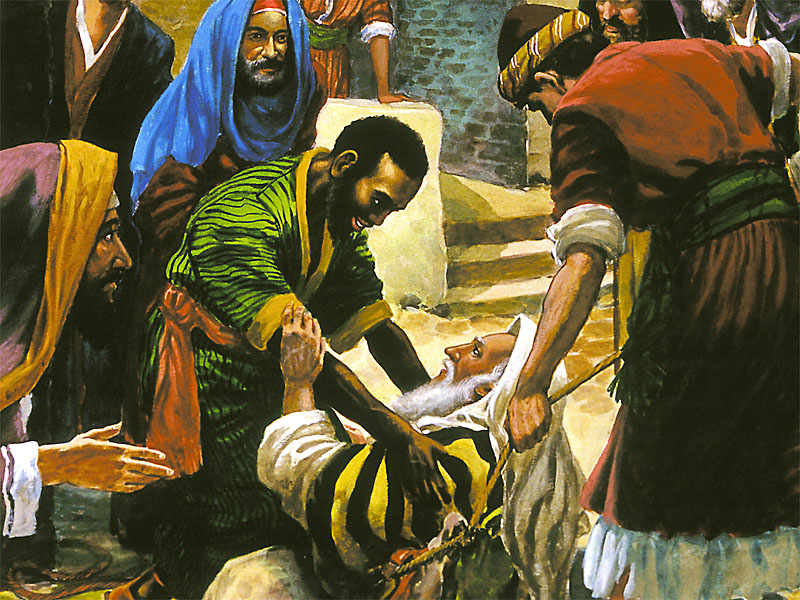
When Jesus woke up, he rebuked the wind and said to the waves, “Silence! Be still!” Suddenly the wind stopped, and there was a great calm. 40 Then he asked them, “Why are you afraid? Do you still have no faith?”
(Mark 4:39-40, NLT)
There He is, sleeping on a pillow, seemingly unaware of the danger that the disciples were facing. They’re suddenly in the middle of a cyclonic fury–a ‘bomb’ of wind and waves that is bursting into their tiny little boat. The twelve had never seen waves so high, or a storm rise up so fast.. At least four were seasoned fisherman, and they knew how to handle a boat. But this storm was way beyond anything they’ve ever faced before.
Maybe it was over crowded; the dimensions of the boat would’ve been around 25-30 feet long, and maybe 7-8 feet wide, more or less, and a single mast. The twelve crowded in, while the four fisherman handled the sail and the rudders. Jesus found His place in the stern. It had been a long full day, and everyone expected a restful crossing. The break would be welcomed.
Why do we doubt? Being unsure and uncertain is a very human quality, especially when everything has gone haywire. Things have turned out really rotten, and now the situation is starting to look even more grim. Our response varies–from mild concern to outright panic. We honestly never know what to expect or how to react. Small things look big. Big things look small.
To put it mildly, the disciples in the storm are scared out of their wits. They’re completely overwhelmed by the possibility of drowning. They are now fighting to stay alive. The waves are getting higher and higher, and the boat ‘groans’ like it wants to fall apart. They pitch up and down, twisting like some wacky ‘roller-coaster’ ride!
“As evening came, Jesus said to his disciples, “Let’s cross to the other side of the lake.”
(Mark 4:35)
Never do they think that Jesus had declared that their destination was across the lake, and certainly not beneath it! But now where is Jesus? Twenty-eight eyes look to the very back of the boat. “Wake Him up, we’re all going to drown.” Funny how we are sometimes. Things are going nuts and we’re starting to come apart. Yet we wait to the last possible moment and seldom consider that Jesus has been in our “boat” all along.
Important idea: When Jesus stands up, and speaks to the wind and waves, He will use the same word as when He freed the demoniac, just a few verses later!
“Teach these new disciples to obey all the commands I have given you. And be sure of this: I am with you always, even to the end of the age.”
(Matthew 28:20)
“I am with you always” is the promise given to each believer. Consider dear one, Jesus has chosen to stay with us and bring His supernatural touch directly into our storm. He will always make an appearance to all who are His. He is “responsible” for you. His intention is to bring you to the other side. His very honor is at stake! (Phil. 1:6). He fully believes He can grow your faith. (Heb. 11:6).
Life can fall apart on us very fast, I know first-hand. And it seems like it’s ‘doubly dangerous’ for those struggling with depression or disability. It’s like we have extra weights put on us, and when you’re barely “treading water,” that really isn’t good. Not only do we have these heavy burdens on us, but we must survive this horrendous storm. (The waves can get massive, and our boat is very small.)
“While I was with them, I protected them and kept them safe by that name you gave me. None has been lost.”
(John 17:12)
The disciples called out to Jesus, and that is all they had to do. The rest belonged to their Lord. Obviously the disciples had zero ability to ‘halt’ their storm. But when they finally summoned Jesus, they became mere ‘spectators.’ All they did was watch as God move, and they simply sat still in amazement. (1 Samuel 12:16). He did all of the ‘work.’
What is going on in your life? Storms will always come, one way or another. These five should help:
- He has promised to bring us to the other side, no debate here
- He is in our boat, and superintends every storm we face
- He understands our limitations, our weaknesses, our griefs, what saddens us
- He has all authority and power, He does what He wants, whenever He wants
- He teaches us to be faithful disciples, and it seems we understand our ‘voyage’ better
We maybe the broken, but perhaps that makes it easier to understand?
With Jesus in my boat,
Bryan
commentsbb@yahoo.com







